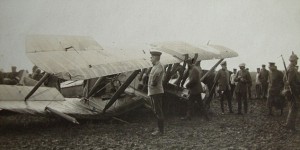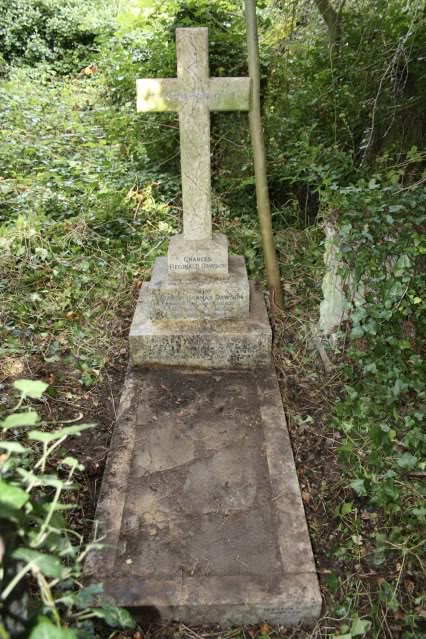Anzac
R. H. M. and P. T. E.
(“The Trifler.” No. 20. February, 1916.)
R. H. M. and P. T. E.
(“The Trifler.” No. 20. February, 1916.)
FromThe Elizabethan, February 1916
When G. C. Formilli was brought down wounded within the German lines, one of the German aviators who brought him down flew back over the British lines to drop a note from him to his C.O., enclosing a letter to his mother.
The full tale was recounted in an article in the Daily Mail, 7th September 2012:
It was on January 5, 1916, that the British single-engine biplane, crewed by pilot Lieutenant and observer Lieutenant Geoffrey Formilli, took off on a reconnaissance flight from Lille.
Unfortunately, they encountered legendary flier Oswald Boelcke — known as the father ofthe German fighter air force and the aviator who trained the Red Baron, Manfred von Richthofen — roaming the skies in his Fokker E IV fighter.
Boelcke sprayed the British plane, a BE2c reconnaissance aircraft, with hundreds of rounds from his machine-guns, forcing it to crash land.

The German ace wrote about what happened when he landed and approached his two enemy airmen:
‘I went straight up to the Englishmen, shook hands with them and told them I was delighted to have brought them down alive. I had a long talk with the pilot, who spoke German well. When he heard my name he said with a grin, “We all know about you!” I then saw to it that they were both taken in a car to the hospital where I visited the observer today and brought him some English papers and photos of his wrecked machine.’
Lieutenant Formilli then wrote a letter to a Captain Babington of the Royal Flying Corps that Boelcke dropped over the British lines.
The letter said:
‘Just a line to say that Somervill & I are alright. We had a scrap with a Fokker. Willy got a graze on the side of his head & I got one through the shoulder half way through. We had most of our controls shot through & had to land & crashed very badly. I am in Hospital now & Willy is in Germany. Will you let my people know please, yours G Formilli. PS. It was Boelcke who brought us down.’
Thomas Dawson was elected as a King’s Scholar at Westminster School in 1909. He was Secretary of the school’s Scientific Society and an active debater. In one debate he argued against compulsory military service stating that ‘Englishmen are becoming keener every year to volunteer, which makes compulsory service unnecessary.’
Dawson was true to his word and although he won a scholarship to Christ Church, Oxford in July 1914, he joined the army on the outbreak of the war. He took a commission as a 2nd Lieutenant in the 19th Battalion of the London Regiment but it was nearly a year before he was sent out to see active service on the Western Front.
Dawson was wounded at the Battle of Loos on 25th September 1915. He was sent back to England to have his wounds treated and ended up in hospital in Vincent Square, not far from the school. He died there from his wounds on 4th February 1916 and a number of pupils were able to attend his funeral at St. Philip’s, Sydenham and burial at Elmer’s End Cemetery, now known as the Beckenham Cemetery. Many of them would have remembered him from his time at the school.
The following letter was sent to the Editor of The Elizabethan following his death:
It is with some diffidence that I ask for the inclusion of this letter, because the paragraphs of eulogy that appear with absolute precision in most school magazines on the dead condemn themselves by their sentimental universality as in most cases obviously untrue. Nor shall I eulogise now. Much might be written upon the three young King’s Scholars whom the battle has claimed so far as its toll. First, we saw the death of W. B. W. Durrant, next of K. T. D. Wilcox, and now it is T. R. Dawson—all three only sons. But it is of the last that I should like to speak, for I was one of the few who knew him well, and it would be a pity if to future generations of Westminsters he were but a name on the wall.

Not popular, not distinguished in athletic or intellectual ability, not striking except in a personality of extraordinary obstinacy and endurance. Such characteristics devoted to low ideals might have brought fame. Directed on the side of the angels, they were realised in full only by those to whom it was given to know him to the very end. It is as the first Head of Water after the revival that the School collectively owes him the deepest gratitude. Head of Water, but he gave up his place in the four when he saw someone better to fill it. But reference to foregoing pages would show in how many ways he did the ‘spade-work’ while others held more showy positions. And it was only his obstinacy that got him into the Army when the War called for officers, for, like Hannibal, he was blind in one eye. And, personally, may the gratitude be recorded of one who knew what it was to be able to rely on him absolutely when all others might fail– gratitude that ‘Bacchus’ Dawson did live once?
Yours as before,
εγρηγορος Φρονημα